One day, SEO professionals realize they need more data than a single tool can provide. This highlights the value of accessing an API (short for Application Programming Interface), allowing for tool customization and enhanced data integration.
Many specialists require APIs not only to access more data but also to create their own tailored and robust platforms to meet unique needs. We aim to equip both categories of specialists with broader options for enhancing SEO efforts through automation or scaling.
This article will compare the leading SEO APIs, examining their strengths, weaknesses, and pricing models.
Why SEO API is Important: 3 Reasons
API is a collection of protocols and tools that facilitates communication between different software systems, enabling them to exchange data and functionalities seamlessly. This tool is essential for specialists seeking to deepen their analysis and embed new capabilities within their applications.
Source: RapidAPI
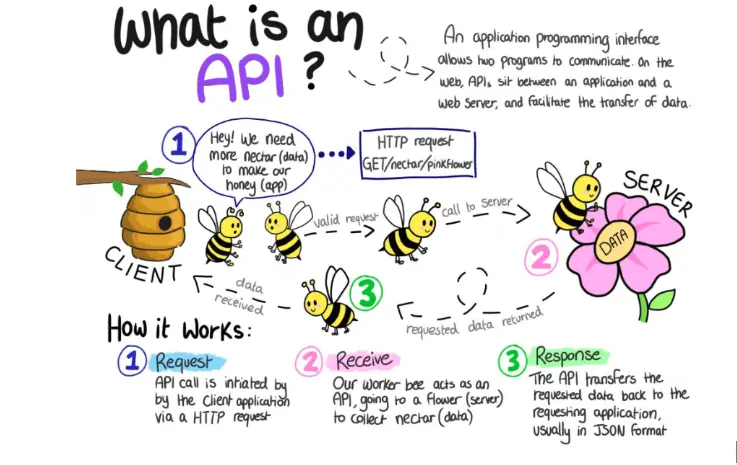
Consequently, leveraging API SEO specialists gain immediate access to data from all sources, allowing them to view, correlate, combine, and manipulate the information in numerous ways.
Using API in SEO makes it easy to create new instruments without understanding how the different data sources were made. Instead, you use the API’s rules to link these data or whole systems and create something new. Here are three main reasons why many SEOs turn to APIs:
- Flexibility. You can connect multiple data sources and combine all this information to create custom datasets or dashboards. An SEO specialist might use integrations from Google Analytics, Google Search Console API, a backlink analysis tool, and a social media analytics platform. There is Google Trends API as well. This allows for tracking website traffic, search performance, backlink quality, and social media engagement in one place.
- Extensive data. You can access vast datasets using an API, which has always been a challenge for SEO professionals looking to optimize websites at a corporate level. This could involve extracting data on keyword difficulty, search volume, and competitor keyword strategies for thousands of keywords.
- Customization. Users can operate a search ranking API to create a custom application that monitors changes for specific keywords in real time. It will be beneficial, first of all, for SEO analysts working on an e-commerce website. Having an API script, you can easily track how changes to product pages (after product descriptions or metadata updates) affect search rankings over time.
The versatility of SEO APIs is demonstrated through practical applications, from creating intricate SEO dashboards that collect data from diverse sources to deploying on-page optimization tools for refining web content based on competitive insights. By strategically using APIs, companies can elevate their workflow.
Data Providers and Their Pricing Strategies
API providers offer data or services through application programming interfaces. Some of them allow the reselling of the data, potentially with added value or customization. The main benefit of reselling includes reduced costs and complexity by leveraging the provider’s infrastructure. However, It should be noted that the rules governing the use, sharing, or modification of SEO data may vary from provider to provider.
SEO API providers help businesses monitor SERP dynamics or backlink profiles, assess competitor strategies, and merge search performance data with advertising metrics for analysis. Furthermore, some SEO API tools facilitate client reporting and social media analysis, unlocking new growth avenues.
Selecting a data provider requires finding a reliable and cost-effective solution. Estimating costs necessitates a clear understanding of the pricing models. Different API-for-SEO providers have various pricing strategies depending on the type, quality, and quantity of data (rows or units). They also offer distinguishing features for customer support. Some common pricing factors are:
- The number of API calls or requests per month
- The number of data points or results per request
- The number of concurrent requests/threads
- The number of projects, domains, keywords, or backlinks
- The frequency of data updates
- The availability of historical or archived data
- The filtering options (not all API providers offer filtering and sorting options for free; some require payment for these services)
- The format, delivery method of data
- The speed of data processing
- The security of data
- The documentation and customer service
- The number of results (an API unit should not be confused with a data row; the unit is used to describe the cost of particular functions or endpoints).
The best approach is to test the API functionality before making significant expenses. The main limitation is that not all data providers offer a trial version or provide it for free.
Providers like Ahrefs, Serpstat, and Moz typically charge monthly, whereas DataForSEO and Semrush employ more varied pricing approaches. We hope the information below will help you navigate the intricate pricing strategies.
8 SEO APIs for Marketers and SEOs
To compare these examples of SEO API data providers in detail, we will list them further with summaries based on the research.
Serpstat
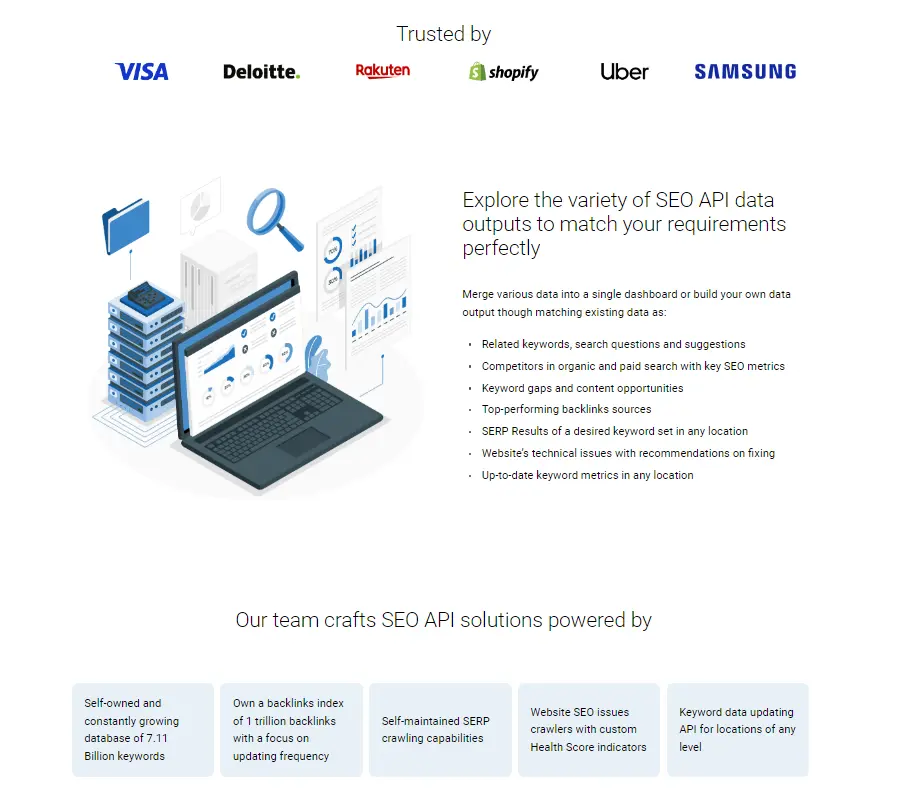
Serpstat SEO API is a crafted solution offering a rich and constantly expanding database. An integral part is the ability to explore a wide array of SEO data outputs, which empowers the integration of detailed insights into workflows. This flexibility allows for merging diverse data streams into a unified dashboard or creating customized data outputs using existing data sets (to uncover related keywords, evaluate competitors, explore content opportunities, and more).
These API sets include:
- Related keywords
- Search questions and suggestions
- Organic and paid search competitors
- Key SEO metrics
- Rank Tracker
- Site audit
- URL Analysis
- Special exports
- Team management, etc.
You can identify keyword gaps and content opportunities, pinpoint top-performing backlink sources, and analyze SERP results for selected keyword sets across different locations. Moreover, the Serpstat API facilitates the discovery of a website’s technical issues, accompanied by actionable improvement recommendations. Backlinks data is based on Serpstat’s own index, which does not have all the representatives of our rating (the index has Anrefs, Semrush, SEO Powersuite, and MOZ).
Features
- An extensive backlinks index of 1 trillion, distinguished by its updating frequency to ensure relevance and accuracy.
- Featuring over 7.11 billion keywords.
- Self-maintained SERP crawling and Search Volume crawling capabilities. A single SERP page analysis costs from $0.0013 to $0.00065, depending on the volume of credits required.
- Tools for SEO diagnostics, including custom Health Score indicators to identify and rectify site issues.
Pricing details
Serpstat offers ‘no-surprise’ pricing with monthly packages. The API access starts from the ‘Team’ plan, 119$/mo. If you need more credits, you can choose a custom pricing plan. There is an “API plan” with access only to the API features, increased request speeds. In that case, we offer separate API access with ten requests per second, priced from $180 to $100 per million rows, depending on the required volume of credits and the duration of use. Plus, we carry over any unused credits to the next period.
Serpstat API provides maximum flexibility in filtering and pagination options to control how many credits each request consumes. The credits will not be deducted if the request returns no data or has an error. We don’t charge for requests, only for returned data.
Starting with Serpstat API:
- Schedule a consultation with our data solutions manager
- Provide a concise overview of your data needs
- Review the SEO API documentation for tailored methods
- Obtain comprehensive API guidelines and initiate test calls
- Enjoy ongoing support throughout your journey
DataForSEO
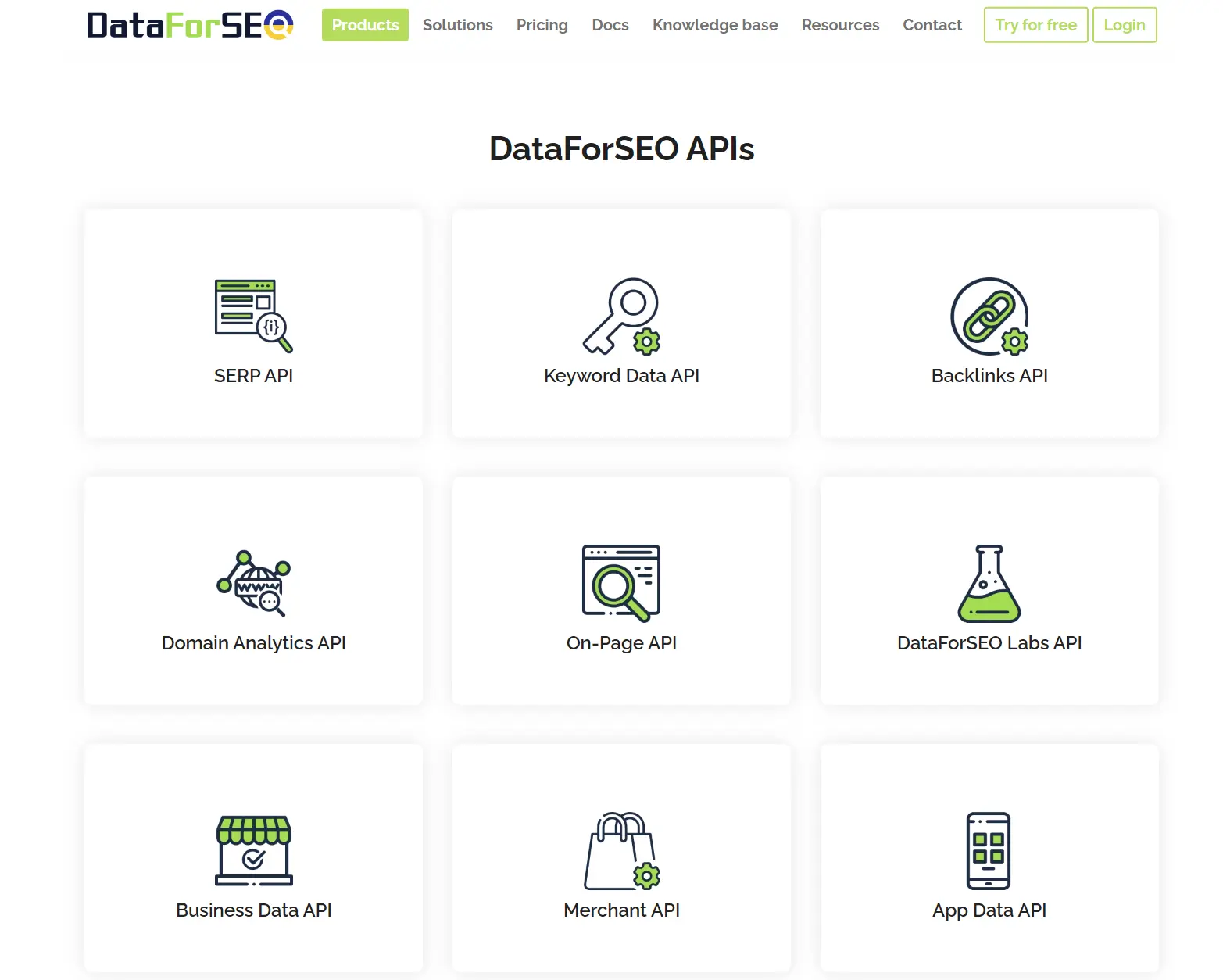
Data for SEO offers an analytical stack for SEO tools: SERP, keywords, API rank tracker, business data, and more. The API platform also provides access to current and historical SEO databases. This API can retrieve data from various search engines, such as Google, Yahoo, and Baidu, and other platforms, such as marketplaces, review sites, and app stores. DataforSEO API can also provide insights on search results, such as organic, paid, maps, news, images, etc.
Features
- Provides structured SERP elements like featured snippets and knowledge graphs.
- Provides structured SERP elements like featured snippets and knowledge graphs.
Pricing details
DataForSEO has a pay-as-you-go pricing model, where you only pay for the data you use. They charge based on the number of data points or results per request and the type and complexity of data. The platform has a minimum monthly payment of $100 and offers a free trial and a refund policy.
Ahrefs
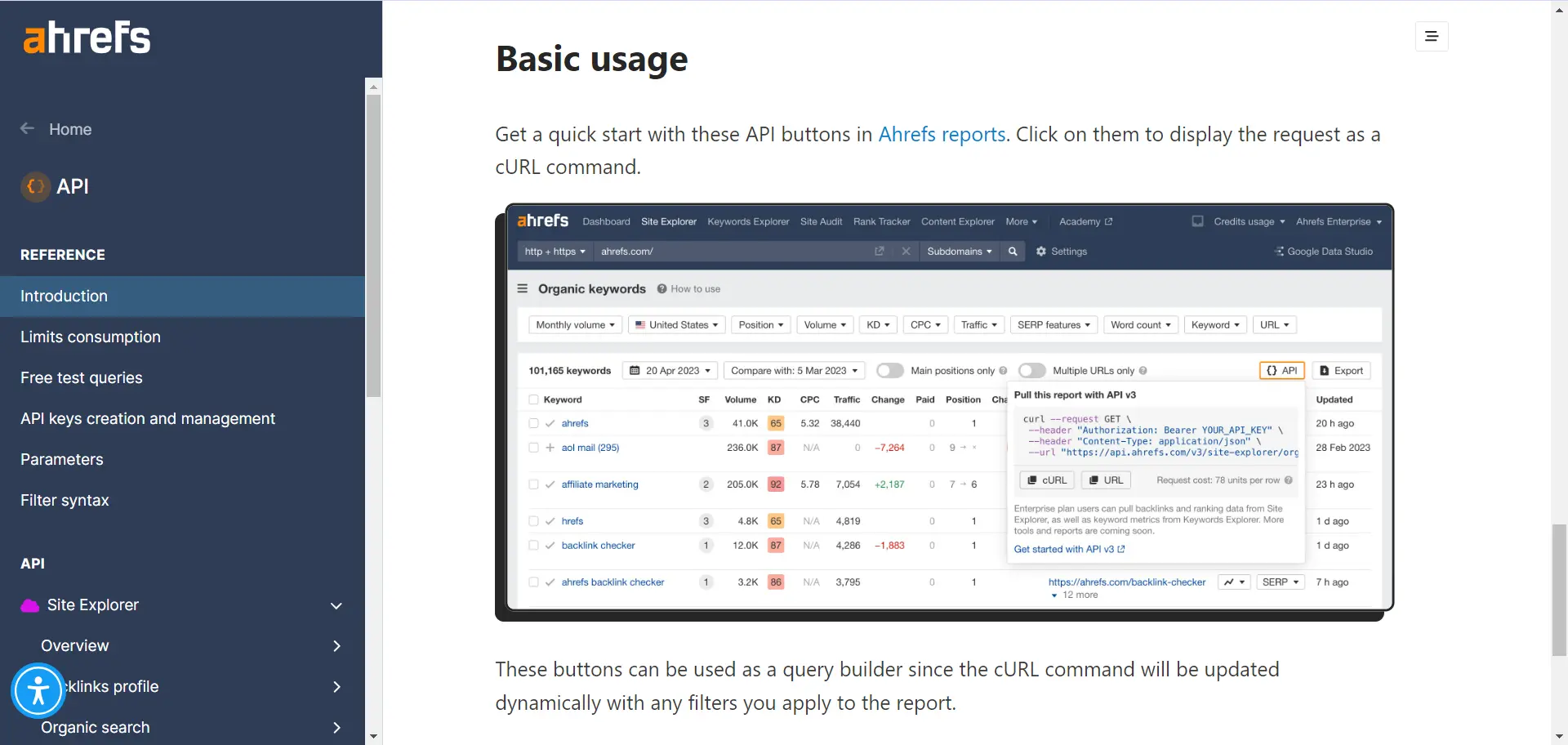
Ahrefs is one of the most popular tools for backlinks. The platform also provides an API for accessing the backlink database. According to Cloudflare Radar’s rating, Ahrefs ranked seventh as the most active web crawler after Google, Bing, and Amazonbot.
The Ahrefs API offers a suite of tools for users looking to leverage the data capabilities of Ahrefs directly into their custom integrations and automation. The latest version of the APIv3 provides access to data points through the Site Explorer, Keywords Explorer, and SERP Overview endpoints.
Features
- Data from Site Explorer (overview, backlinks, referring domains, organic keywords, and so on)
- SERP overview method (top 100 search results analysis)
- Prepay options for API units at reduced rates for annual subscriptions
- Direct cURL command generation for queries from Ahrefs reports
Ahrefs API pricing
Ahrefs has a subscription-based pricing model, where you pay a monthly fee based on the number of rows or results/units per month. Ahrefs API is fully available for Enterprise plans, ranging from $999/mo. There is limited access to API for other plans.
Semrush
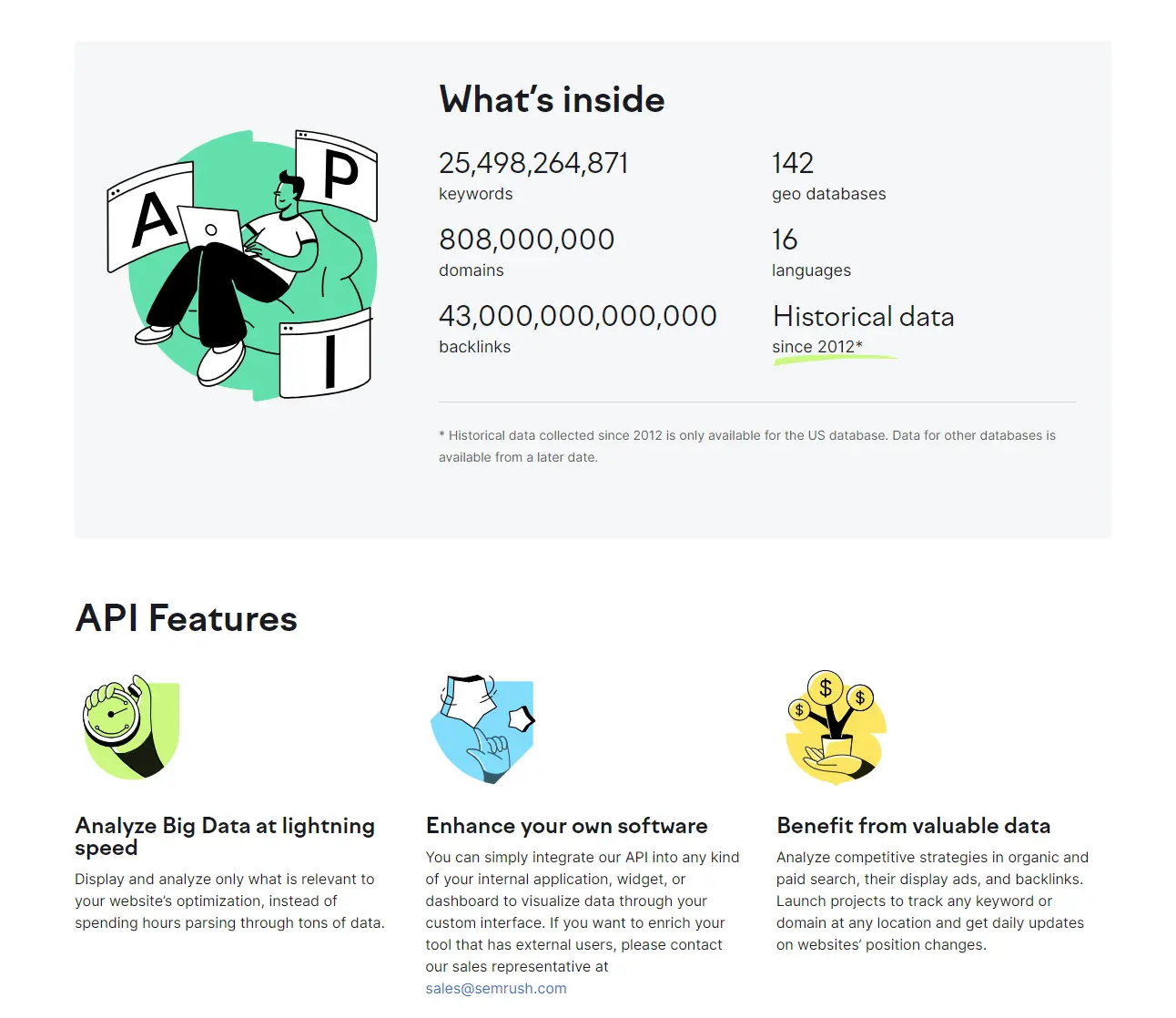
Semrush is another popular SEO tool with an API for accessing keywords, domains, backlinks, and traffic. Additionally, it can be used to analyze ads and the organic ranking of your competitors. Semrush API facilitates automated, efficient data gathering for large datasets, offering quicker data retrieval than its interface. It lets you get JSON or CSV data.
The platform’s API is structured around three main categories, featuring a variety of reports within the Analytics API, Projects API, and Accounts API.
This API provider supports integration into custom dashboards, CMS, widgets, and software. Digital agencies and data resellers especially favor it.
Features
- Allows reselling Semrush data
- Offers two main API packages: Standard API (including Projects and Analytics SEO API) and Traffic Analytics API, with access based on subscription plans and additional purchases
- Allows for extensive keyword research and large-scale Position Tracking campaigns.
Semrush API price
Semrush API has a hybrid pricing model, where you need to activate a Semrush Business subscription for $449.95 per month and purchase extra API units. They charge based on the number of API units or requests per month and the type and complexity of data. The platform has different prices for different data types, ranging from $20 to $250 per 1 million API units.
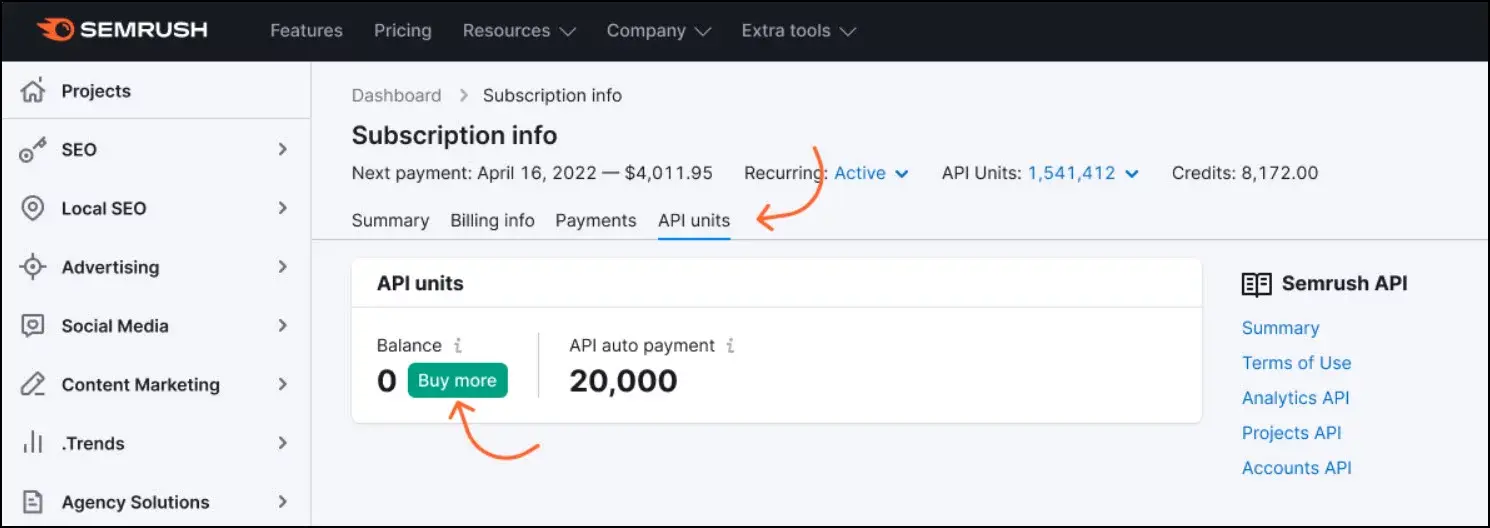
MOZ
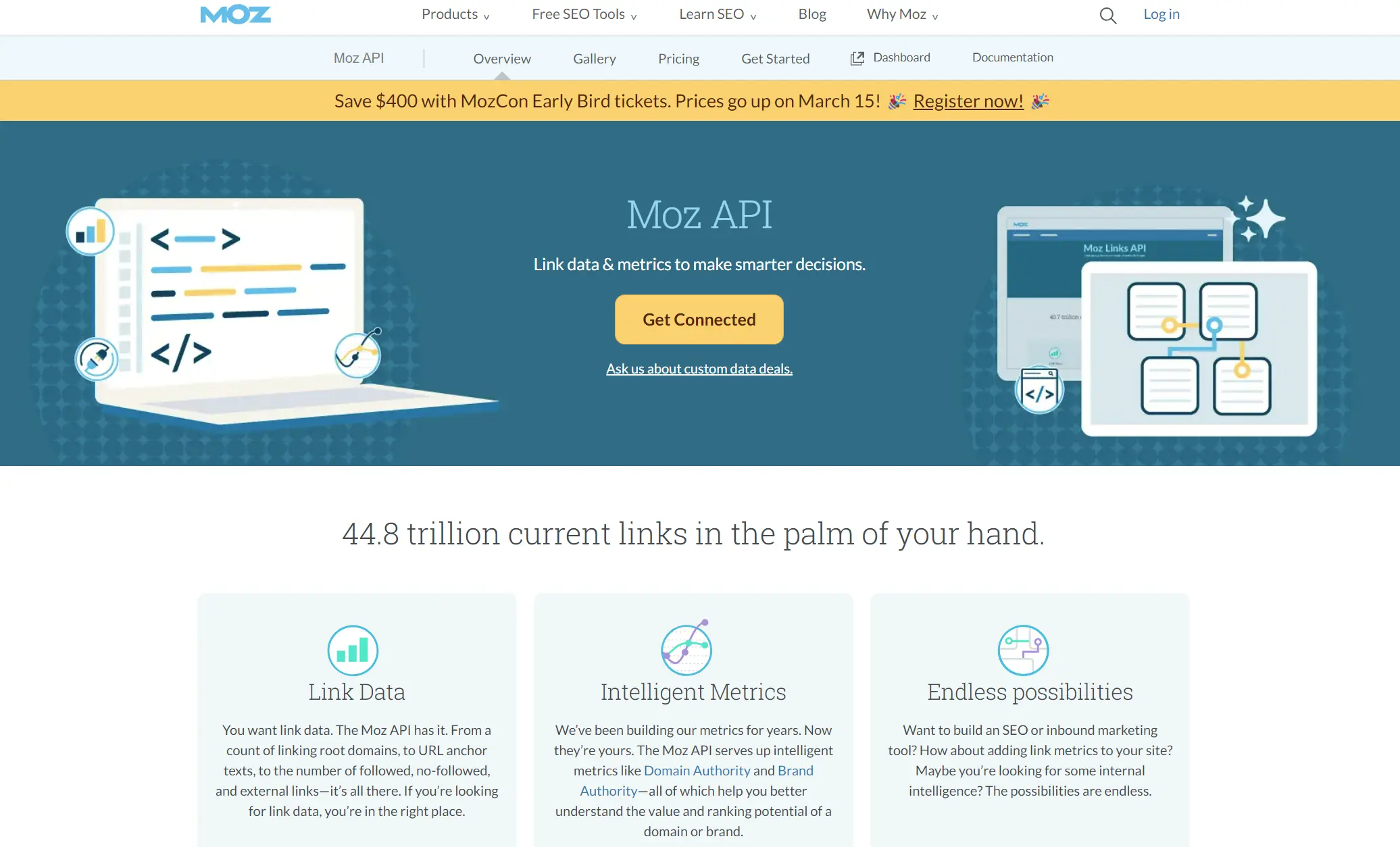
The Moz API offers comprehensive link and off-page data analysis. It enables users to access external links, no-follow tags, URL anchor texts, and domain/page authority intelligent metrics.
SEO MOZ API is excellent for analyzing large volumes of URLs for SEO & PR agencies, enterprise marketing teams, and mergers & acquisitions professionals.
Features
- Up-to-date link data
- Suitable for building SEO tools
MOZ API pricing
Moz API plans are structured based on the monthly rows accessed. Pricing starts at $250/month for 120,000 rows, scaling up to options for accessing 40 million monthly rows. This tiered pricing model has the possibility for custom data deals upon request.
SEO PowerSuite
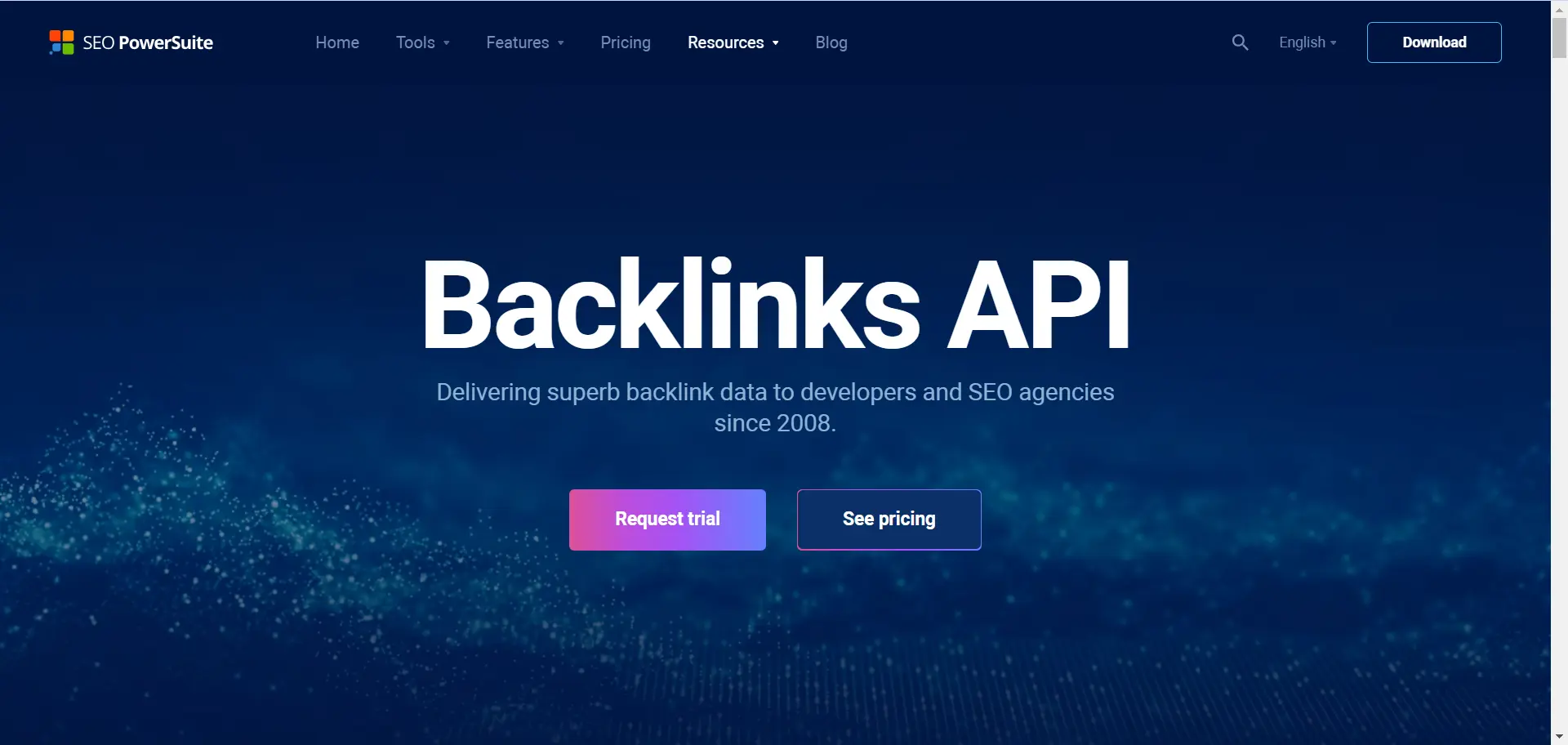
SEO PowerSuite is a kit of four tools that cover various aspects of SEO, such as keyword research, rank tracking, backlink analysis, and site audit. Unlike most search engine optimization tools, SEO PowerSuite offers a desktop application package. The platform’s backlink API lets users get referring domains, pages, anchors, and metrics.
Features
- Index of 3.6 trillion external links (also have live and historical backlink data)
- Sophisticated algorithms, including unique metrics like InLink Rank and Domain InLink Rank
- Referral domains, IPs, anchor texts, etc.
Pricing details
SEO PowerSuite has a subscription-based pricing model, where you pay a monthly fee based on the monthly results. They have three plans, ranging from $149 to $899/month, and offer a free trial and a money-back guarantee.
SE Ranking
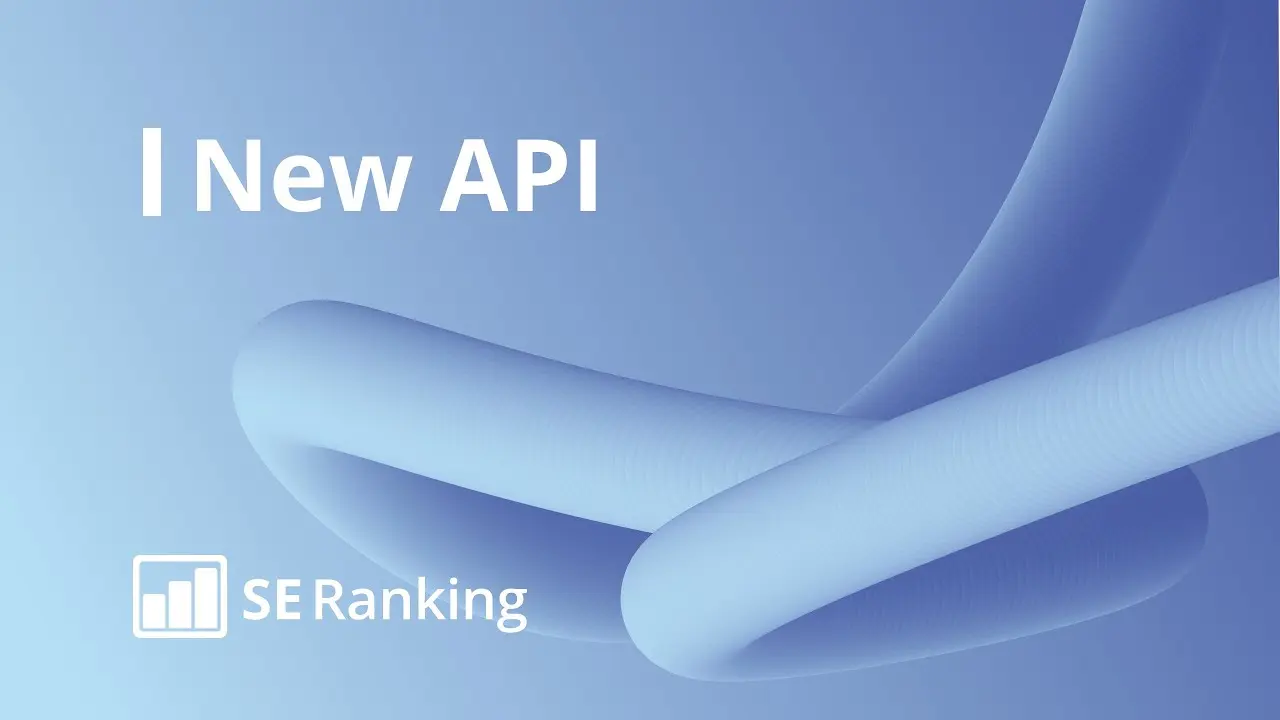
SE Ranking API provides a solution for managing extensive SEO data, allowing for its integration into any business application, widget, or dashboard. This API directly offers access to SEO metrics from the SE Ranking platform (website ranking in organic search results, traffic, current and historical keyword rankings, search volume, difficulty, etc). Users can generate complex reports.
To maintain the quality of service for all clients, SE Ranking credits the query speed, allowing no more than 10 API calls per second. Exceeding this limit triggers a temporary restriction. The data obtained through SE Ranking’s API is strictly for personal use.
Features
- Technical SEO performance issues identification
- Project management API (creation, setup, or deletion of projects)
Pricing details
SE Ranking’s API pricing is designed to accommodate the needs of mid-sized to large agencies and businesses (advanced data processing capabilities, priority support). The API’s features are available monthly at $239.00, with a 14-day free trial to explore. Additional costs for specific requests include $0.005 per keyword for search volume checks.
SEO Explorer
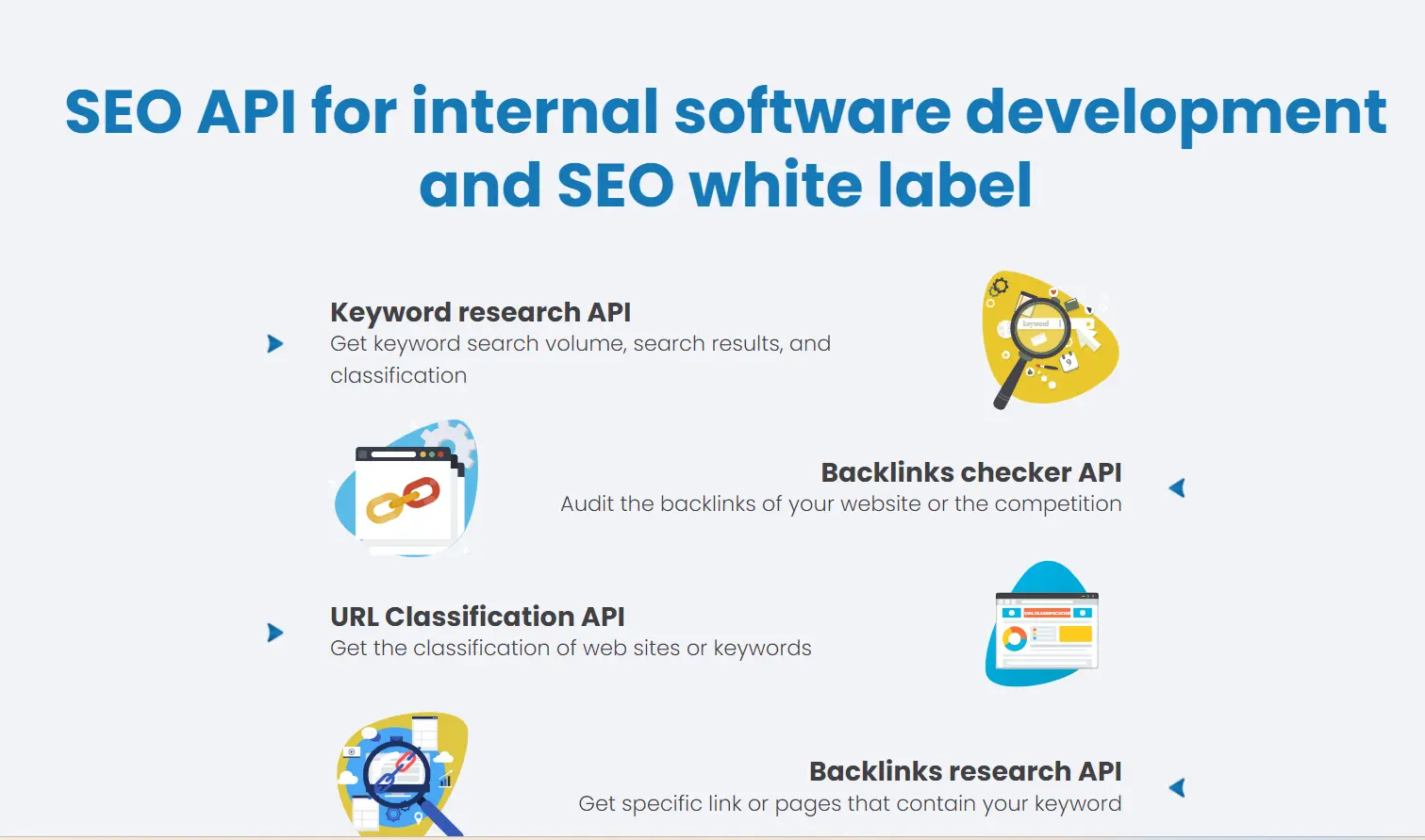
The SEO Explorer API offers SERP performance analysis, enabling users to access keyword research, backlink analysis, and URL classification data. This API is crafted for digital agencies, SaaS developers, and in-house SEO teams — a tech-savvy audience looking to enhance their digital marketing or SEO offerings.
It supports internal SEO research, plugin integration for displaying specific data to users, and the development of white-label SEO software. Simple to use with HTTPS requests and JSON responses, the SEO Explorer API is compatible with any programming language that supports HTTPS.
Features
- URL classification for websites or keywords, assisting in targeted marketing and content strategy
- Allows to identify specific links or pages containing targeted keywords for detailed backlink research
Pricing details
Internal use and research pricing begins at $24.99 per month, with detailed plans available for different usage levels. For white-label and public usage, pricing starts at $74.99 per month, with options for one-time payment for API credits for those needing extensive data access.
Conclusion
Assessing various SEO APIs based on their cost, documentation, performance, and current data becomes indispensable. This strategic evaluation ensures that you select an API that fits your budget and becomes a seamless addition to your SEO toolkit.
Serpstat offers one of the market’s most effective keyword research and backlink analysis APIs. With access to real-time search engine results with a ranking API, highly customizable results, and a range of pricing options, this API is a comprehensive solution. Don’t hesitate to experiment with various API providers to discover the best fit for your needs.
FAQ on API
Using an API requires the right tools and basic knowledge. Postman and Insomnia are two of the most popular API tools. Both platforms offer user-friendly interfaces that simplify making API requests and interpreting responses.
You’ll first need to obtain an API key, which is your unique access code for the API you wish to use. Once you have your key, launch either Postman or Insomnia. These tools allow you to quickly enter your API request details, including the endpoint URL, request method (GET, POST, PUT, DELETE), headers, and required body data. Don’t forget to include your API key in the request header or query parameters as needed for the API documentation.
After configuring your request, hit the “Send” button. The tool will then process your request and display the response from the API server. Depending on the API, this response can include data in formats like JSON or XML.
REST API (Representational State Transfer) is a distinct type of API. It stands out because it uses the principles of REST, an architectural style for designing networked applications. REST is not a protocol like the other web services. Instead, it is a set of architectural principles.
REST APIs operate through standard HTTP methods such as GET, POST, PUT, and DELETE. This approach distinguishes REST APIs from others, such as SOAP (Simple Object Access Protocol) APIs, which are more rigid in communication formats and often rely on more complex messaging protocols. Its stateless nature makes it popular for building scalable, high-performance web services.
API is enabled to automate data reception and integration, turning raw data into readable formats like spreadsheets or dashboards.
There are more opportunities for API usage in SEO:
- On-page optimization. You can extract necessary data such as titles, metadata, and content length.
- SERP trends analysis. You can track domain-specific SERP changes and seasonal trends.
- Integrated performance. You can merge keyword and Google Ads data to view search strategy effectiveness.
- Indexed page tracking. You can monitor and compare the number of indexed pages across multiple sites.
- SEO monitoring. You can track the effectiveness of SEO strategies with dedicated dashboards.
Webhook APIs represent a distinct category that inverts the usual request-response model seen with traditional REST APIs. Instead of actively sending a request to an API for data, webhook APIs are designed to send you notifications automatically when specific events occur.
For example, if you’re managing an online store, a webhook API could alert you when a particular item is restocked, eliminating the need to check the API for updates constantly.
- SEO Powered Content & PR Distribution. Get Amplified Today.
- PlatoData.Network Vertical Generative Ai. Empower Yourself. Access Here.
- PlatoAiStream. Web3 Intelligence. Knowledge Amplified. Access Here.
- PlatoESG. Carbon, CleanTech, Energy, Environment, Solar, Waste Management. Access Here.
- PlatoHealth. Biotech and Clinical Trials Intelligence. Access Here.
- Source: https://serpstat.com/blog/seo-api-value-for-money



